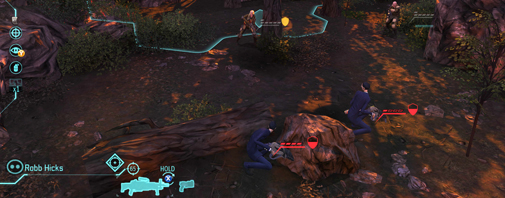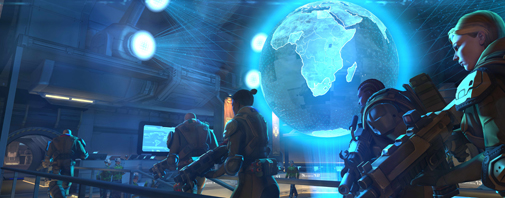GamingBolt is XCOM central command this week, leaving you with no doubt whatsoever that XCOM: Enemy Unknown is an essential purchase. Here’s our second instalment of Aftermath, our post-release interviews with key game creators discussing games post-release, this time it’s Jake Solomon, Lead Designer on XCOM: Enemy Unknown.
Jordan Garland: Well done on an absolutely stellar job with XCOM: Enemy Unknown, you’ve done everybody proud and I think I speak for everyone when I say I simply cannot stop thinking about the next time I’m going to be playing. I appreciate you’ve been putting your hearts and souls into an excellent final product and you all deserve a massive hug and a rest.
Jake Solomon: Thanks very much! We’re all really excited it’s out finally. I still kind of can’t believe it myself, despite having the box on my desk and everything.
Jordan Garland: First off, which key details of the original UFO/XCOM games led to Firaxis creating its first non-Sid Meier game?
Jake Solomon: I have always been a huge fan of the original game. X-Com was the reason I majored in computer science, and I have been bugging everyone since I joined Firaxis 12 years ago for a chance to remake it.. In some ways, it’s good nobody listened to me, because I think we ended up with a perfect combination of talented people, solid technology, and support from 2K when we got the greenlight to make the game.
As far as details go, I think most XCOM fans would agree that there are a few key features which have to be in the game: Turn-based combat, a strategy layer over top of the combat game, and seriously punishing consequences. In a lot of ways, the story of XCOM is the one that comes out of your play, and we wanted to make sure that our XCOM still had those classic moments, like a rookie taking a Hail Mary shot and killing the alien that was going to destroy you next turn.
Jordan Garland: The Thin Man looks like a lizard wearing a Yoko Ono costume, where did the inspiration for him come from?
Jake Solomon: I can honestly say nobody has ever made that Thin Man comparison. Usually people say he looks like their cousin or this guy they know. He’s inspired by the Men In Black of UFO mythology. He also had a really important gameplay role to fill as a poisonous alien that might appear weak, but had to be respected by even veteran soldiers.
Jordan Garland: I was 2 when the original UFO: Enemy Unknown came out. How does it feel to be bringing such a marvellous franchise, recreated so impeccably, to an entirely new generation?
Jake Solomon: Like I said, it’s sort of unreal. We’ve made this game because we love the original so much and we want people to have those classic XCOM moments that you remember years later. We really wanted to get those emotional high points of the original in there. There aren’t too many games like XCOM out there, and we wanted to bring that experience to more people. People who were fans of the original game have been great at spreading the word to their friends who maybe didn’t ever play the original: “You must play this game, and you must name all your soldiers after your friends and they’ll die and it will be awesome.”
Jordan Garland: What’s your opinion on chest-high walls?
Jake Solomon: They’re excellent for keeping small dogs in the yard. No, seriously, the cover system was a way to let us emphasize positioning as part of the combat system. My personal opinion is that half-cover is good, and full cover is much better, and cars are only good cover if there’s nothing else around.
Jordan Garland: Did you originally design it to be as cover-heavy as the finished article?
Jake Solomon: We started with a prototype that was very similar to the original X-Com, where there wasn’t cover per se. We wanted a system where soldiers interacted more, and so we added abilities that linked together in interesting ways and started to work more as a squad. That actually made the game less interesting tactically when you had a huge number of guys because you could pretty much sweep the opposition on your turn. So we kept iterating on squad size and combat dynamics, and I think there was a pretty big shift at some point and the current version of the combat system was added, and suddenly the game felt a lot more tactical, and a lot more about making decisions with real consequences.
Jordan Garland: What exactly led the team to the two-step move/shoot mechanic, rather than giving some units more/less based on their attributes?
Jake Solomon: A lot of the decision was tied up with the other aspects of the combat system: classes, abilities, inventory, and so forth. But another part of it was that the time unit system really got in the way of people treating their squads as a team. It was more like trying to optimize a whole series of algebraic formulas all at the same time. The really interesting decision is: “How am I going to handle two Mutons over there and a Thin Man who ran away a second ago but might come back later?” The move-action system is a more direct way of implementing your plan: Heavy fires a rocket, the Assault run-and-guns up the flank to shoot the survivors, and the Support goes into overwatch.
Jordan Garland: Were there any game play features that were originally part of the game but you guys had to leave them due to any technical, financial or time-constraints?
Not really. I had a lot of stupid ideas that deserved to be cut because they were bad design, and the team called me on them. We got everything we wanted into the game.
Jordan Garland: What made you decide to bring the game to consoles, historically strategy games have often fared poorly in that area so was this move seen as somewhat of a gamble?
Jake Solomon: We didn’t think so because we knew the original game was awesome, and if we could get people fired up about the game, it almost didn’t matter what hardware you were developing for. And full credit goes to 2K for fully backing us up during development, which was a very creatively brave decision.
Jordan Garland: What are your thoughts on current generation of consoles? Do they offer a stream lined development process like the PC does?
Jake Solomon: There are some production advantages to working on consoles because obviously their hardware is consistent, and any PC developer can tell you how much fun compatibility testing can be. But I love them all – it’s been a great console generation cycle.
Jordan Garland: XCOM weaves a more in-depth and compelling narrative with ‘voiceless’ marines than most manage with bonafide characters, why do you think this is? Do you feel this says something about the state of storytelling in war-games?
Jake Solomon: I think XCOM is special because so much of the story is what happens in the game, and your imagination creates the scene around it. We can do little things like give Sergeants their nicknames, and give you the ability to change the appearance and names of your soldiers, but the narrative is created by the gameplay. That’s part of the beauty of these kinds of games, where so much of it is open ended that you almost can’t help telling yourself more of the story as you go along. Sharing those stories is a common thread that binds veterans of XCOM.
Jordan Garland: Thanks for your time Jake, we all really appreciate it and plan to be playing XCOM for months to come.
Jake Solomon: My pleasure! It was great talking to you.
Well if that hasn’t whet your appetite for the destruction of alien scum then literally nothing will, ever. XCOM: Enemy Unknown scored 9.5/10 and I’m seriously considering asking it to move in with me.

















